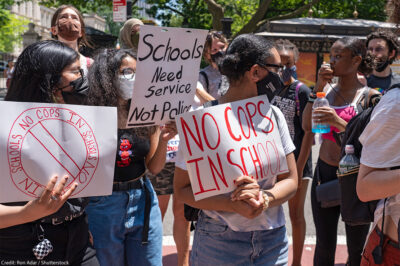New ACLU-NJ Guide Helps Families Steer Children Away From Juvenile Justice System
Previewing a first-of-its-kind study to be released in January, this resource for parents highlights opportunities for kids to avoid the justice system
NEWARK – In time for winter break, the ACLU of New Jersey has released a guide to help children and their families take advantage of alternatives to entering the juvenile justice system following an encounter with police.
Especially intended for parents and guardians, the guide offers critical information on diverting children from the criminal justice system in time for December’s school holidays, when kids are more likely to have unsupervised time on their hands.
“We’ve all seen the scenario in old TV shows and movies: a parent arrives at a police station to pick up their child, who leaves with a stern warning and an opportunity to make amends rather than a criminal record. The technical term for this practice is diversion, and it’s a critical but underutilized tool for ending mass incarceration,” said Portia Allen-Kyle, Pratt Criminal Justice Transparency Fellow at the ACLU-NJ. “If we’re going to reduce the number of people we put behind bars, we need to prevent involvement with the criminal justice system in the first place. That starts in childhood.”
The ACLU–NJ’s guide sheds light on the two programs all law enforcement agencies have the authority to use to avoid criminalizing New Jersey’s children: stationhouse adjustments and curbside warnings. Rather than arresting children for offenses like breaking curfew, loitering, or trespassing, officers can give children opportunities to avoid a record if they agree to certain conditions or promise to stay out of trouble for a certain period of time.
The one-page guide, formatted as an FAQ, comes ahead of a forthcoming ACLU-NJ white paper, Missed Opportunities: Youth Diversionary Programs in New Jersey. The publication, scheduled for a January release date, will be the first of its kind to take an in-depth look at diversionary programs and their utilization in New Jersey. Its findings include the following:
- Of 5,239 stationhouse adjustments – a type of diversionary program – given to children between 2014 and 2016, more than two-thirds resulted in kids being successfully diverted from the juvenile justice system. But,despite these largely successful outcomes, more than 40 percent of municipalities among the 17 counties studied by the ACLU-NJ didn’t utilize them.
- There is stark racial disproportionality in the use of stationhouse adjustments. While young Black people made up 28.3 percent of juvenile drug arrests in 2015, they made up only 11.3 percent of those who received stationhouse adjustments for drug, alcohol, and tobacco offenses.
- In New Jersey, officers made more than 1,400 juvenile arrests for curfew and loitering violations in 2015 alone, and more than 60 percent of these young people were Black. However, in the 17 counties studied by the ACLU-NJ, only 13 stationhouse adjustments were given for these exceedingly low-level violations – and 10 of the 13 youths were white.
Stay Informed
Every month, you'll receive regular roundups of the most important civil rights and civil liberties developments. Remember: a well-informed citizenry is the best defense against tyranny.




